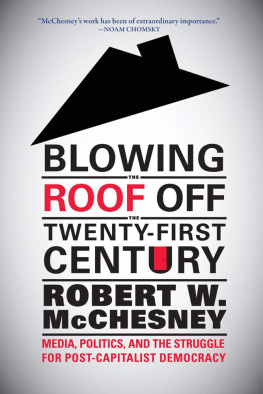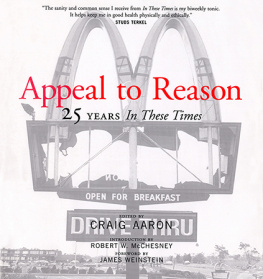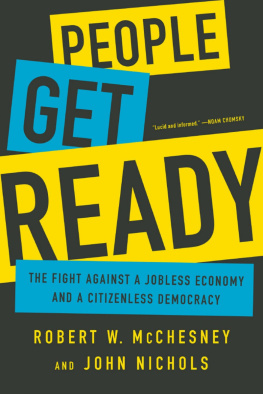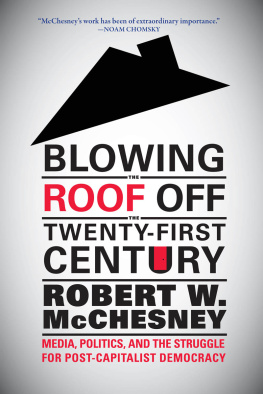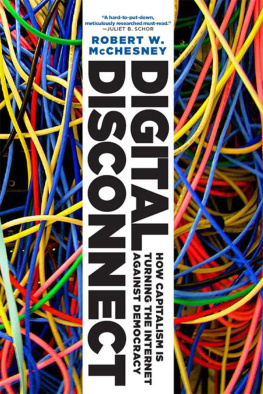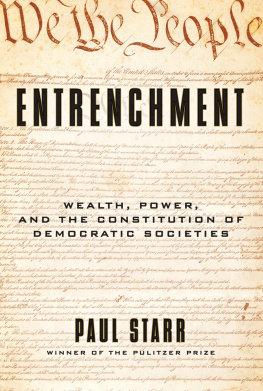Blowing the Roof Off the Twenty-First Century
Blowing the Roof Off the
Twenty-First Century
Media, Politics, and the Struggle for
Post-Capitalist Democracy
ROBERT W. MCCHESNEY

Copyright 2014 by Robert W. McChesney
All Rights Reserved
Library of Congress Cataloging-in-Publication Data
McChesney, Robert Waterman, 1952
Blowing the roof off the twenty-first century : media, politics, and the struggle for post-capitalist democracy / Robert W. McChesney.
pages cm
ISBN 978-1-58367-478-9 (hardback)
1. United StatesEconomic conditions21st century. 2. United StatesPolitics and government21st century. 3. CapitalismUnited States. 4. DemocracyUnited States. 5. Mass mediaPolitical aspectsUnited States. I. Title.
HC106.84.M397 2014
320.973dc23
2014026733
Typeset in Adobe Garamond Pro
Monthly Review Press
146 West 29th Street, Suite 6W
New York, New York 10001
www.monthlyreview.org
5 4 3 2 1
Contents
2. After the Nader Campaign:
The Future of U.S. Left Electoral Politics
Preface
HOWARD ZINN FAMOUSLY SAID that you cant be neutral on a moving train. In the twenty-first century it seems like the train is approaching the speed of light. In this book I chronicle the forces that are depressing our politics, our economy, our culture, and our ecology, to the point where sober minds now contemplate the prospect of human extinction with equanimity. I explain why these problems are not insurmountable; they can be addressed and solved. Indeed, we have within our grasp the possibility of building the most extraordinary society humans have ever known, and could scarcely imagine. But to do so will require nothing short of revolutionary change, the likes of which have only rarely been seen in history.
We have to blow the roof off the twenty-first century.
This is a radical argument: I contend that the central barrier to progress is the capitalist political economy. The solution to this barrier is to establish a post-capitalist democracy. This is the great and defining struggle of our times.
This book consists of eleven essays and an interview. One essay was written in 2001, and the interview was conducted in 2007; the balance of the book was written since 2008, and four of the essays were written in the past year with precisely this book in mind.
During the past six years as these essays were written, I was working on several other related books. These addressed the state of journalism, The Death and Life of American Journalism (2010), with John Nichols; the Internet, Digital Disconnect (2013); the U.S. electoral system, Dollarocracy (2013), with John Nichols; and the current state of U.S. capitalism, The Endless Crisis (2012), with John Bellamy Foster. In only a few instances do the essays herein touch directly on the material in those books. But the material in the other books provides the foundation upon which this research and analysis is based.
The book has four sections. expands upon this critique with research essays on the extraordinary militarization of the U.S. political economy, both globally and domesticallyincluding the rise of the prison-industrial complex.
also brings forward fresh research on one of my central research preoccupations: the collapse of the commercial model of journalism and how we might develop policies to establish the caliber of independent, uncensored, competitive public service journalism necessary for any known theory of self-government to succeed.
of that era faded, and the long decades of neoliberalism became dominant, this tradition was mostly lost to history.
I argue in this final section that this very rich tradition is exactly where progressives, socialists and small-d democrats need to turn as we look for workable and attractive alternatives to the dead-end street for humanity presented by really existing capitalism. The heart and soul of a post-capitalist democracy must be vibrant, independent media.
Many of these essays originally appeared in Monthly Review; I indicate in the chapters endnotes where the original version appeared. I thank all of the original publishers for their permission to run these pieces. Four of the essays were co-authored in their original versions, and were very much joint collaborations. was conducted by Megan Boler. To make all the essays in the book consistent, I have switched the pronoun voice to first-person singular for the co-authored pieces herein. But that in no way is meant to imply that these were not entirely collaborative efforts, for which John, Hannah, and Jamil often did the heaviest lifting.
I have made minor revisions and copyedits on all of the essays, and significant changes to a few. I have not attempted to update the essays from 2008 to 2011 to make them appear au courant. This is intentional; I want to demonstrate how the sands have shifted since the economic collapse of 2008. In some ways it seems as if we have experienced an entire generation in the past seven years.
The people at Monthly Review and Monthly Review Press have been supportive since I first broached the idea of the book. I wish to thank my editor, Michael Yates, in particular, and also Scott Borchert, Spencer Sunshine, John Mage, John Simon, and Martin Paddio. This book would not exist without John Bellamy Duke Fosters assistance and guidance. I cant believe how fortunate I was more than forty years ago to cross paths with him in Olympia, Washington. The book also benefits from long conversations over the years with Duke, Vivek Chibber, Johnny Nichols, and Inger Stole. Many of my arguments and much of my analysis crystallized by talking with them.
The manuscript received a top-to-bottom edit from Jeff Cohen and Matt Rothschild. How fortunate I am that two of my best friends, whose knowledge I respect and whose judgment I trust in toto, happen to be extraordinary editors. Erin Clermont did the final editing job, and gets credit for making the book legible. Once again, Elliot Linzer proved to be indexer extraordinaire. Thanks, too, go to Sigurd Allern, Victor Pickard, Mandy Troger, Ryan Wishart, Bill Domhoff, Josh Silver, Ben Scott, and Toby Miller for assistance with some of the material herein. I could get no work done without the assistance of Amy Holland. And finally, thanks to my Department of Communication and the University of Illinois at Urbana-Champaign for supporting my research over the years. It is great to have public research universities in the public interest. Lets work to see that they survive and prosper.
As always, my heart belongs to Lucy, Amy, and Inger.
This book is dedicated to Noam Chomsky and the late Andr Schiffrin, two friends and mentors. The quality of this book and all of my work increases to the extent it reflects the lessons and values they taught me.
CHAMPAIGN, ILLINOIS
MADISON, WISCONSIN
JUNE 2014
1
America, I Do Mind Dying
Please, mister foreman, slow down that assembly line
I dont mind working but I do mind dying.
JOE L. CARTER, Please, Mister Foreman, blues song, 1965
THESE ARE PERILOUS TIMES for capitalism, the reigning political economic system of the United States and the world. The economy is stagnating, and Mother Earth is gravely ill. In the second decade of the twenty-first century, we face widening economic inequality, plutocratic governance, endless militarism and mounting planetary ecological degradation.
Not many years ago, this would have sounded hyperbolic to many people. But today, it is not just radicals who are sounding alarm bells. Nobel Prizewinning economist and
Next page
